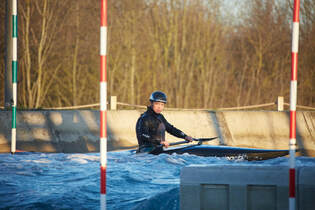
From others
I'm a naturally curious person, so I tend to ask a lot of questions. Sometimes they're pretty hard questions, which inevitably result in hard answers. Which is fine; as long as I'm prepared for them. Through a lifetime of trial and error, I have found my success rate is around 25%. That's another 75% of taking discussion slightly too personally, which is pretty draining for everyone involved! For other curious athletes, I'd say that doesn't necessarily mean STOP asking questions. But it's important to learn that another human's response isn't just a reflection on you. You need to be open to their own experience and opinion which shapes the response they give you.
Also, because other people are curious, they'll often give you unsolicited opinions, advice, warnings, directions and criticism. That's alright too; social rules mean someone has to feel pretty strongly to give you advice that you didn't ask for. Which is cool, because it means they want to help; or feel good. I think it's even more important to have self awareness in those moments. Just because someone else says you're jumping wrong, doesn't mean you need to change the way you jump. Or even think about why they want you to jump differently. It's just information on offer, for your acceptance or declination.
From yourself
I think I'm doing pretty well in the whole recovery thing. Actually I think a long rest is one of the best things I've ever done in my canoeing career; it's changed the way I feel about recovery, post season breaks and general health. But obviously there's plenty of self doubt swimming around; have I started back with too much, or too little? Did I take enough time, did I take too much time? That's a really long, difficult cycle of thought that my brain would be quite happy to jump right on. Actually the most valuable thing I've had from a long recovery break, is stepping back and saying, it's alright. If you want to go on that cycle, go ahead, but I'm not coming with you.
From being a much younger paddler, I've had a strong mental reliance on doing what other people tell me to do in terms of rest, recovery, and injury. Being curious, I've learnt a lot about physiology and what a body needs. I've also learned loads about what it really DOESN'T need! This is the first year in a while I've had a chance to sit back and make my own decisions about how it all feels. I've had the most amazing professional support through the whole process, but what feels really liberating and terrifying, is the shots being called by me. Terrifying though it is, actually I'm the only person in the whole process that is with me 24/7. I'm the only one who knows exactly what sessions I'm doing, exactly how they all feel, and what my brain is doing in the middle.
So...
I think self-doubt can be useful, as long as it helps you ask the right questions and seek the right help. I think it is NOT useful, when it begins an existential crisis. I think it's different from anxiety, because if you use it right there's a vast amount to be learned. But if you dwell on it, in my experience, there's a lot more tension in your brain. And the biggest, most important lesson I've learned, is that if there's tension in your brain then there is definitely tension in your body.
The most inspiring athletes in the world overcome insane mental and physical barriers, often without injury. I think it says a lot about brain conditioning. If you can relax your brain into the flow of self confidence and self doubt, then your body will just flow along with it. I'm definitely not a physiologist or a coach or anyone who should be teaching mental approach. But I reckon the more relaxed an athlete is, the healthier their body is able to be.
 RSS Feed
RSS Feed
